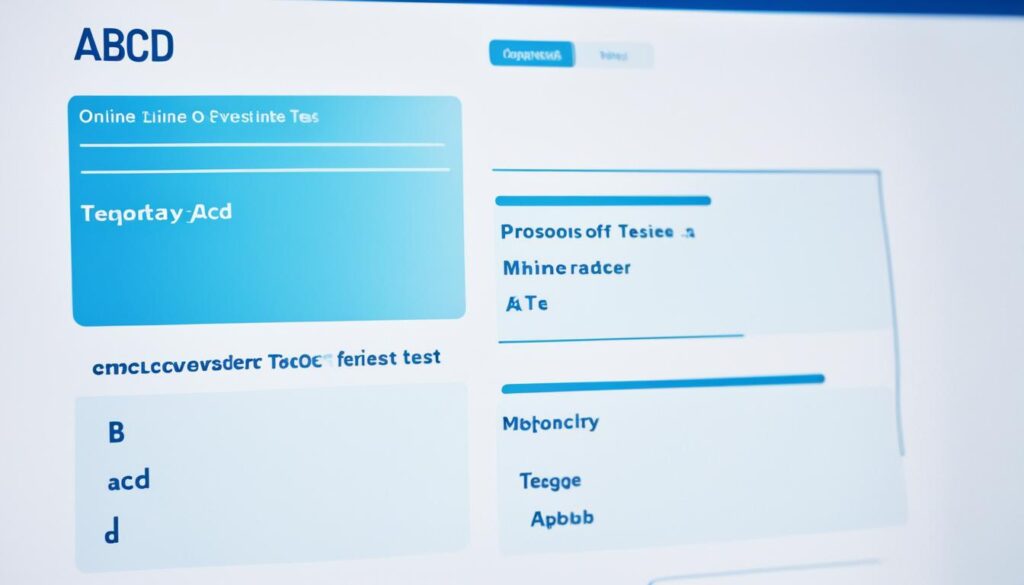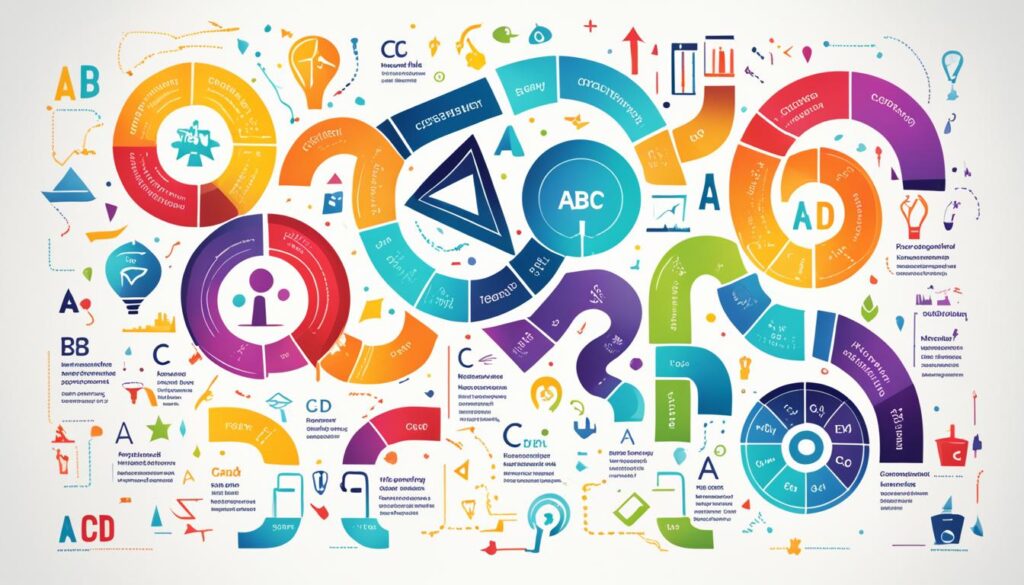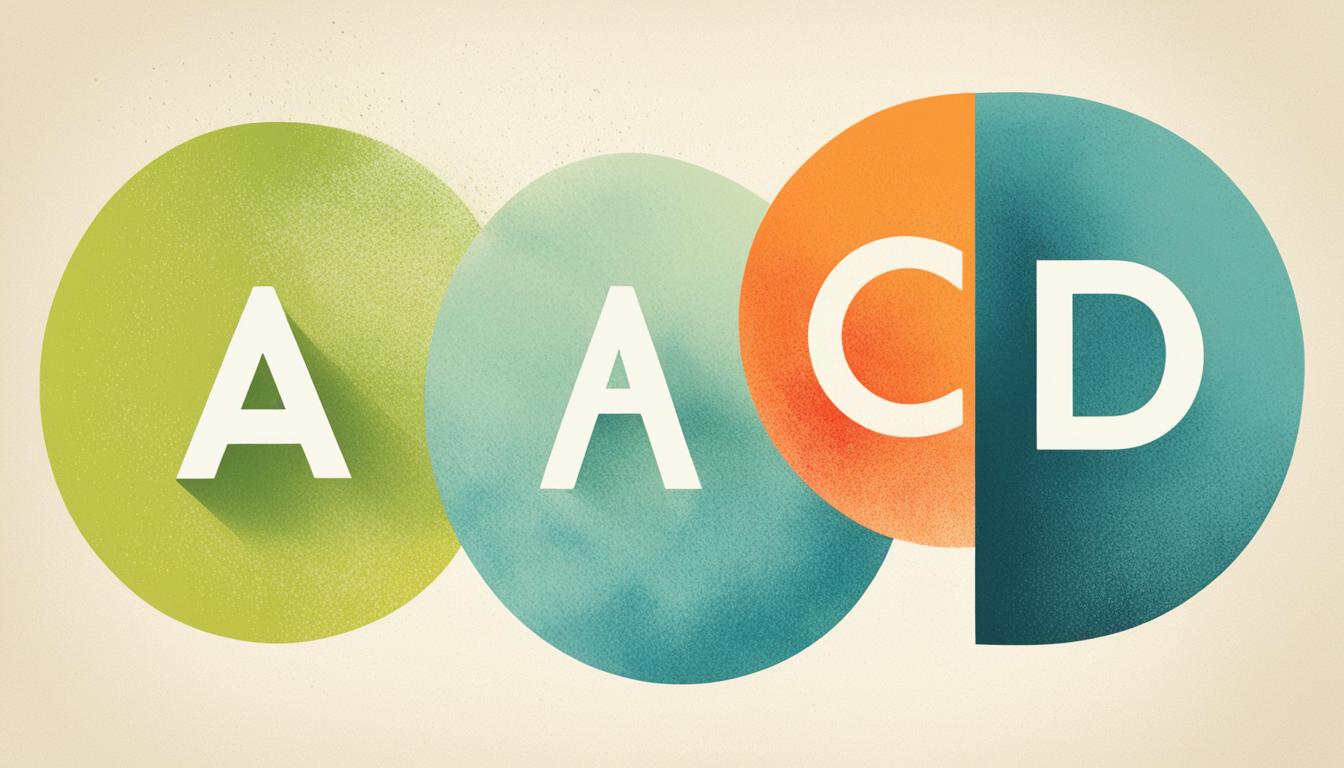Have you ever considered that by taking a personality assessment, you can gain valuable insights into your strengths, weaknesses, and motivations?
These tests have gained immense popularity in recent years as individuals strive to gain a better understanding of themselves and their unique traits. One such test that has gained significant attention is the ABCD Personality Test.
By taking the ABCD Personality Test, you can uncover which of the four distinct types – Type A, Type B, Type C, or Type D – you identify with. Each type comes with its own set of characteristics and motivations that shape your behavior and choices.
Are you ready to delve into the fascinating world of personality assessment and discover your type? Let’s explore the ABCD Personality Test together!
Key Takeaways:
- The ABCD Personality Test provides valuable insights into your personality traits and characteristics.
- There are four distinct types in the ABCD Personality Test: Type A, Type B, Type C, and Type D.
- Understanding your personality type can help you make informed decisions and navigate various aspects of your life.
- The ABCD Personality Test can be a valuable tool for self-discovery and personal growth.
Understanding Type A Personality
People with Type A personalities possess a unique set of traits that shape their behavior and outlook on life. These individuals are characterized by their competitive nature, goal-oriented mindset, ambition, and organizational skills. They thrive in leadership positions and are driven by success, monetary rewards, and challenging endeavors.
Being highly motivated and focused, Type A individuals possess several strengths that contribute to their success:
- Competitiveness: Type A personalities have a strong desire to outperform others and achieve the best results.
- Goal-oriented mindset: They set clear objectives and work relentlessly to accomplish them.
- Ambition: Type A individuals have a burning desire to climb the ladder of success and achieve recognition.
- Organizational skills: They excel at planning, managing tasks, and staying on top of their responsibilities.
However, Type A personality traits also come with certain weaknesses. These weaknesses can be addressed with self-awareness and focused efforts:
- Resistance to others’ opinions: Type A individuals may struggle to consider alternative perspectives and be more assertive in expressing their own views.
- Controlling nature: They have a tendency to take charge and want things done their way, which can lead to conflicts with others.
- Quick to anger: Due to their drive and intensity, Type A individuals can be prone to feelings of frustration or irritation.
Understanding the strengths and weaknesses of Type A personalities is crucial for personal growth and successful career choices. The ideal careers for Type A individuals capitalize on their strengths and provide an environment that nurtures their ambitious nature:
| Type A Strengths | Ideal Careers |
|---|---|
| Competitiveness | Business, sales, entrepreneurship |
| Goal-oriented mindset | Project management, consulting, law |
| Ambition | Executive leadership, finance, politics |
| Organizational skills | Operations management, event planning, logistics |
Understanding Type B Personality
Type B individuals are known for their relaxed, easy-going nature and their ability to bring a sense of fun and comfort to those around them. They possess unique strengths and weaknesses that shape their approach to work and everyday life.
Type B Strengths
- Creativity: Type B individuals are often creative thinkers, able to generate innovative ideas and solutions. They possess a unique perspective that can bring fresh insights to any situation.
- Adaptability: Their laid-back nature allows Type B personalities to adapt well to changing circumstances. They can handle unexpected challenges with ease and flexibility.
- Interpersonal Skills: Type B individuals are naturally charming and likable. They have an ability to make others feel comfortable and valued, which helps them build strong relationships.
Type B Weaknesses
- Time Management: Due to their relaxed nature, Type B individuals may struggle with meeting deadlines and staying organized. They may find it challenging to prioritize tasks and stay focused.
- Motivation: Type B personalities may lack the competitive drive and ambition associated with Type A individuals. They may require external motivation to stay engaged and driven in their endeavors.
- Detail-Oriented Tasks: Their preference for a big picture approach may make Type B individuals less suited for roles that require meticulous attention to detail.
Despite these weaknesses, Type B personalities thrive in roles that value adaptability, creativity, and interpersonal skills. Ideal career paths for Type B individuals include public speaking, customer service, entertainment, and hospitality.
So, if you find yourself leaning towards a more relaxed and easy-going approach to life, embrace your Type B personality and leverage your strengths to excel in your chosen endeavors.
Life is a journey, and each personality type brings its unique strengths and weaknesses to the table. Embrace who you are and make the most out of your own personality traits.

| Type B Strengths | Type B Weaknesses |
|---|---|
| Creativity | Time Management |
| Adaptability | Motivation |
| Interpersonal Skills | Detail-Oriented Tasks |
Understanding Type C Personality
Type C individuals possess a unique set of characteristics that set them apart from other personality types. They are detail-oriented, focused perfectionists who thrive in environments that require analytical thinking and precision. These individuals find great satisfaction in their work and are motivated by the pursuit of excellence.
One of the key strengths of Type C personalities is their exceptional attention to detail. They have a natural ability to spot even the smallest errors and are meticulous in their approach to tasks. This attention to detail enables them to produce high-quality work that is often praised for its accuracy and reliability.
Additionally, Type C individuals excel at working independently. They are self-motivated and can maintain high levels of productivity without the need for constant supervision or external validation. Their focused and disciplined nature allows them to concentrate deeply on their work and consistently deliver outstanding results.
However, Type C personalities also have their weaknesses. They tend to struggle in social situations, as they may find it difficult to express their emotions or understand the feelings of others. This can sometimes lead to misunderstandings or a lack of connection with colleagues or friends.
Furthermore, their perfectionistic tendencies may cause them to become overly critical of themselves and others. Type C individuals often set exceptionally high standards and may become frustrated or stressed when these expectations are not met. This internal pressure can sometimes hinder collaboration and prevent them from delegating tasks effectively.
Despite these challenges, Type C individuals are highly valued in certain career fields. Their analytical thinking, attention to detail, and ability to produce high-quality work make them excellent candidates for careers in engineering, research, data analysis, inventing, and writing.
When it comes to understanding Type C personality, it’s important to recognize their strengths and weaknesses. By leveraging their attention to detail and independent working style, Type C individuals can make significant contributions in their chosen fields. However, they should also be mindful of their social skills and strive to develop effective communication strategies to enhance their interpersonal relationships.
| Type C Strengths | Type C Weaknesses |
|---|---|
| Exceptional attention to detail | Difficulty in social situations |
| Ability to work independently | Perfectionistic tendencies |
| Analytical thinking | Overly critical of self and others |
Overall, Type C individuals are an integral part of diverse industries and contribute their unique strengths to the workforce. By understanding and appreciating their personality traits, we can create environments that foster their success and encourage their continued growth.
Understanding Type D Personality
Type D individuals possess unique qualities that make them an essential part of any team or social circle. They are known for their kind, caring, and patient nature, which makes them reliable and supportive friends and colleagues. Let’s delve deeper into the strengths and weaknesses of Type D personalities.
Strengths of Type D Personality
One of the key strengths of individuals with Type D personality is their ability to create and maintain meaningful relationships. People with Type D personalities are highly empathetic and display great emotional intelligence, allowing them to connect with others on a deep level. Their caring and nurturing nature make them excellent listeners and support systems for those around them.
Additionally, Type D individuals are remarkably organized and value routines. They thrive in structured environments and are unwavering in their commitment to completing tasks efficiently and effectively. This attention to detail and reliability make them ideal team players, especially in administrative roles or jobs that require strong organizational skills.
Weaknesses of Type D Personality
While Type D individuals possess many admirable qualities, they may face certain challenges. Quick thinking may not be their strongest suit, as they tend to take their time to process information thoroughly. This inclination toward a more deliberate thought process can sometimes hinder their ability to make snap decisions or adapt to unexpected changes.
Moreover, individuals with Type D personality are naturally averse to big changes. They find comfort in familiarity and stability, which can make it challenging for them to embrace new situations or environments. However, once they have had the time to adjust, they can excel in their roles.
It’s essential for Type D personalities to be mindful of their tendency to become overwhelmed by stress and avoid bottling up their emotions. Open communication and seeking support when needed can help them navigate difficult situations more effectively.
“Type D individuals are the pillars of support and stability, valuing connections and routines in their personal and professional lives.” – Anonymous
Here is a table summarizing the strengths and weaknesses of Type D personalities:
| Strengths | Weaknesses |
|---|---|
| Highly empathetic and caring | Slow decision-making process |
| Great emotional intelligence | Resistance to big changes |
| Excellent listeners and support systems | Tendency to be overwhelmed by stress |
| Organized and reliable | Difficulty with quick thinking |
By understanding the strengths and weaknesses of Type D personalities, we can appreciate the positive contributions they bring to various environments. Their caring nature, organizational skills, and steadfastness make them valuable assets in careers such as therapy, administration, medicine, and human resources.

Take the ABCD Personality Test Online
Discover your unique personality type by taking the ABCD Personality Test online. This free personality test provides valuable insights into your strengths, weaknesses, motivations, and ideal career paths based on your personality type. It’s a valuable tool for self-discovery and gaining a better understanding of yourself.
Through a series of carefully designed questions, the ABCD Personality Test evaluates your preferences, behaviors, and attitudes to determine which of the four distinct types you align with: Type A, Type B, Type C, or Type D. Once you receive your results, you can explore the characteristics and traits associated with your personality type.
Are you a competitive and ambitious Type A individual, or a relaxed and creative Type B individual? Perhaps you resonate with the detail-oriented and focused Type C, or the caring and organized Type D. The ABCD Personality Test will help you uncover these aspects of your personality.
Understanding your personality type can have a profound impact on your life, influencing your relationships, career choices, and personal growth. By recognizing your strengths and weaknesses, you can leverage your natural abilities and work on areas that need improvement.
“The first step of self-improvement is self-understanding.”
Benefits of Taking the ABCD Personality Test Online
- Gain insights into your unique personality traits
- Discover your strengths and weaknesses
- Understand your motivations and drives
- Identify ideal career paths aligned with your personality type
- Enhance self-awareness and personal growth
Example of ABCD Personality Test Results
| Personality Type | Strengths | Weaknesses | Ideal Careers |
|---|---|---|---|
| Type A | Competitive, goal-oriented, ambitious | Can be controlling, easily angered | Leadership positions, sales, business, politics |
| Type B | Relaxed, easy-going, creative | Struggles with deadlines, staying organized | Public speaking, customer service, entertainment, hospitality |
| Type C | Detail-oriented, focused, analytical | Struggles with social situations, understanding emotions | Engineering, research, data analysis, inventing, writing |
| Type D | Caring, patient, organized | Trouble with quick thinking, big changes | Therapy, administration, medicine, human resources |
Take control of your self-discovery journey by taking the ABCD Personality Test online. Understand your unique personality type and leverage its insights to make informed decisions and live a more fulfilling life.

Applying the ABCD Personality Test to Careers
The ABCD Personality Test is not only useful for gaining insights into your personality type but also for career assessment. By understanding your unique personality traits and characteristics, you can identify the ideal career paths that align with your strengths and motivations. Whether you excel as a Type A leader, a Type B creative, a Type C analytical thinker, or a Type D caregiver, the ABCD Personality Test can help you discover the perfect job that suits your personality.
Identifying Your Ideal Career
When it comes to finding a fulfilling career, it’s essential to consider your natural inclinations and preferences. The ABCD Personality Test can guide you in identifying the industries and roles that are most suitable for your personality type.
“Your career is where your passion meets your purpose.”
- Type A Personality: If you possess strong leadership skills, are ambitious, and thrive in competitive settings, you may excel in positions that require taking charge and driving teams towards success. Consider careers in sales, business management, entrepreneurship, or politics.
- Type B Personality: If you’re laid-back, creative, and enjoy a more relaxed approach to work, consider roles that allow for flexibility and creativity. Careers in public speaking, customer service, entertainment, or hospitality may be a good fit.
- Type C Personality: If you’re detail-oriented, analytical, and have a natural inclination towards precision, consider careers that require problem-solving and critical thinking skills. Fields such as engineering, research, data analysis, invention, and writing may be well-suited for you.
- Type D Personality: If you’re compassionate, caring, and thrive in nurturing roles, consider careers that involve helping others. Roles in therapy, administration, medicine, or human resources may provide a fulfilling career path.
Achieving Success in Your Chosen Career
Once you’ve identified your ideal career path based on your personality type, it’s important to focus on developing the necessary skills and refining your strengths to excel in your chosen field.
“Success is not the key to happiness. Happiness is the key to success. If you love what you do, you will be successful.”
Remember to leverage your unique traits to your advantage. If you’re a Type A leader, embrace your natural drive and utilize your organizational skills to lead teams effectively. If you’re a Type B creative, let your imaginative thinking shine and find innovative solutions to problems. Similarly, if you’re a Type C analytical thinker, capitalize on your attention to detail and deliver precise results. And if you’re a Type D caregiver, utilize your empathy and compassion to create meaningful connections with others.
Continuously work on developing both your personal and professional skills to further enhance your success in your chosen career. Seek learning opportunities, networking events, and mentorship programs that align with your industry and interests.

Understanding your personality type through the ABCD Personality Test can empower you to make informed decisions about your career and set you on the path to professional satisfaction and fulfillment.
The Impact of Personality on Self-Discovery
Self-discovery and self-awareness play significant roles in personal growth. Understanding our unique personality traits and characteristics through tests like the ABCD Personality Test can provide valuable insights into how we interact with the world around us and identify areas for improvement.
By embracing our strengths and working on our weaknesses, we can enhance both our personal and professional lives. Recognizing our personality traits enables us to make conscious decisions that are better aligned with our true selves.
“To thine own self be true.” – William Shakespeare
By taking the time to explore our personality through self-discovery, we can gain a deeper understanding of our behaviors, motivations, and preferences. This knowledge can be a powerful tool in guiding our life choices and fostering personal development. Self-awareness allows us to recognize patterns in our thoughts, emotions, and relationships, enabling us to make positive changes and achieve a greater sense of fulfillment.
The Role of Personality Traits Test
Personality traits tests, like the ABCD Personality Test, provide a structured framework for self-discovery. These tests help us identify core aspects of our personalities, such as our tendencies, strengths, and weaknesses. By highlighting these traits, personality tests empower us to make informed decisions and adapt our behaviors to maximize our potential.
- Self-discovery: Personality tests offer a starting point for self-discovery by providing a comprehensive overview of our traits. They encourage introspection and self-reflection, allowing us to dive deeper into our own psyche.
- Insights into interaction: Understanding our personality traits helps us better understand how we interact with others. Whether it’s in personal relationships or professional collaborations, this awareness can enhance our communication skills and foster better connections.
- Spotlight on strengths: Personality tests highlight our strengths, enabling us to leverage them for personal and professional growth. By capitalizing on our innate abilities, we can excel and find greater fulfillment in our endeavors.
- Identifying weaknesses: Personality tests also shed light on our weaknesses or areas for improvement. Recognizing these areas empowers us to take action and develop new skills, leading to personal growth and self-improvement.
Embracing the insights provided by personality traits tests allows us to take a proactive role in our own development. By using this knowledge as a guide, we can navigate life’s challenges and opportunities with a greater sense of self-awareness and confidence.
The Power of Self-Discovery
Self-discovery is not a one-time event but an ongoing journey. It involves continuous learning, exploration, and growth. By embracing self-discovery, we can unlock our full potential and lead more fulfilling lives.

| Benefits of Self-Discovery | |
|---|---|
| 1. | Improved self-esteem and self-confidence. |
| 2. | Better decision-making abilities. |
| 3. | Enhanced personal relationships. |
| 4. | Increased resilience and adaptability. |
| 5. | Alignment with personal values and goals. |
| 6. | Greater clarity about life purpose and meaning. |
Self-discovery is a journey of authenticity, personal growth, and fulfillment. By understanding our personality traits and leveraging them to our advantage, we can live a life true to ourselves and make meaningful contributions to the world around us.
The History of the ABCD Personality Types
Let’s delve into the fascinating history of the ABCD personality types and how they came to be. This classification system was initially introduced by renowned cardiologists, Meyer Friedman and Ray Rosenman, during the 1950s. These two brilliant minds embarked on a quest to better understand the relationship between personality types and heart disease.
Initially, their research focused on Type A and Type B personalities. Type A individuals were characterized by their ambitious, competitive nature, high levels of stress, and a sense of urgency. In contrast, Type B individuals were more laid-back, relaxed, and less prone to stress. The findings revealed that Type A individuals were more susceptible to heart disease, while Type B individuals had a lower risk.
As the research progressed, Friedman and Rosenman expanded their study to include two additional personality types: Type C and Type D. Type C individuals were characterized by their analytical nature, attention to detail, and a tendency to suppress emotions. On the other hand, Type D individuals exhibited traits such as introversion, worry, and a tendency to experience negative emotions.
“The ABCD personality types were born out of our research into the intricate connection between personality and heart disease. We discovered distinct patterns and behaviors that have far-reaching implications for individuals’ well-being and overall health.” – Meyer Friedman
The ABCD personality types categorize individuals based on their behavior, attitudes, and responses to stress. This categorization provides valuable insights into how different personality types navigate the challenges of life and cope with stressors.
By understanding your own personality type, you can gain self-awareness and make informed decisions that align with your strengths and weaknesses. Embracing your unique personality traits can lead to personal and professional growth, ultimately enhancing your overall well-being.
Now that we’ve explored the history of the ABCD personality types, let’s dive deeper into the significance of the ABCD Personality Test and how it can help you gain a better understanding of yourself.

| Personality Type | Description |
|---|---|
| Type A | Ambitious, goal-oriented, and prone to stress |
| Type B | Relaxed, easy-going, and adaptable |
| Type C | Analytical, detail-oriented, and emotionally reserved |
| Type D | Introverted, worrisome, and prone to negative emotions |
The Significance of the ABCD Personality Test
The ABCD Personality Test holds great importance when it comes to personality profiling, evaluation, and understanding various personality traits. This test provides individuals with a comprehensive way to evaluate and profile themselves based on their unique personality characteristics. By recognizing and embracing our individual personality types, we can gain a deeper understanding of our strengths, weaknesses, motivations, and ideal career paths. Armed with this knowledge, we are better equipped to make informed decisions and navigate life more effectively.
Recognizing Personal Strengths and Weaknesses
One of the key benefits of the ABCD Personality Test is the ability to identify and analyze our individual strengths and weaknesses. Through a systematic evaluation of our personality traits, we can gain valuable insights into areas where we excel and areas where we may need improvement. This self-awareness enables us to harness our strengths and address any weaknesses, fostering personal growth and development.
Understanding Motivations
Personality evaluation through the ABCD Personality Test facilitates a greater understanding of our motivations and what drives us. By delving into the depths of our personality traits, we gain insights into what motivates us to excel and achieve our goals. This self-awareness allows us to align our aspirations and actions with our core motivations, bringing us closer to realizing our full potential.
Navigating Ideal Career Paths
Another significant aspect of the ABCD Personality Test is its ability to guide individuals toward their ideal career paths. By carefully analyzing our personality traits and characteristics, we can identify professions that align with our strengths, preferences, and motivations. This knowledge not only paves the way for career satisfaction but also enhances productivity and success in the chosen field.
“The ABCD Personality Test offers individuals a roadmap to self-discovery, enabling them to identify their strengths, weaknesses, motivations, and ideal career paths.”
The significance of the ABCD Personality Test lies in its ability to facilitate personal growth and development through personality profiling, evaluation, and recognition of our unique traits. By leveraging this knowledge, we can make informed decisions, enhance our self-awareness, and strive towards a fulfilling and purpose-driven life.

Conclusion
The ABCD Personality Test is a powerful tool that provides valuable insights into your unique personality type. By taking this personality quiz, you can gain a deeper understanding of yourself, your strengths, and your weaknesses. Armed with this knowledge, you can embark on a journey of self-discovery and personal growth.
Whether you identify as a Type A, Type B, Type C, or Type D, each personality type has its own set of characteristics and tendencies. Embracing your personality analysis allows you to leverage your strengths to their fullest potential and work on areas that may need improvement.
By understanding your personality type, you can also make more informed decisions about your career and personal life. Identifying the ideal career paths and environments for your personality type can lead to greater job satisfaction and overall fulfillment.
So why wait? Take the ABCD Personality Test today and unlock a wealth of insights into your true self. Start your journey of self-discovery and embrace the power of personality analysis. Discover your type and unleash your potential!
FAQ
What is the ABCD Personality Test?
The ABCD Personality Test categorizes individuals into four distinct types: Type A, Type B, Type C, and Type D. It helps you discover which type you identify with and gain insights into your personality traits and characteristics.
What are the characteristics of Type A personality?
Type A individuals are competitive, goal-oriented, ambitious, and organized. They excel in leadership roles and are motivated by success, money, and challenges. However, they may struggle with considering others’ opinions and can be controlling or easily angered.
What are the characteristics of Type B personality?
Type B individuals are relaxed, easy-going, and fun-loving. They are creative thinkers who make others feel comfortable. While they may struggle with deadlines and staying organized, they excel in roles that require adaptability and a laid-back approach.
What are the characteristics of Type C personality?
Type C individuals are detail-oriented, focused perfectionists who thrive when working alone. They excel in careers that require analytical thinking and precision. However, they may struggle with social situations and understanding the emotions of others.
What are the characteristics of Type D personality?
Type D individuals are kind, caring, patient, and organized. They are reliable friends who prefer a simple life and value routines. While they may have trouble with quick thinking and big changes, they are content with the familiar.
How can I take the ABCD Personality Test online?
You can take the ABCD Personality Test online to discover your type. This test provides insights into your strengths, weaknesses, motivations, and ideal career paths based on your personality type.
Can the ABCD Personality Test help with my career assessment?
Yes, understanding your personality type through the ABCD Personality Test can help you identify career paths that align with your strengths and motivations. It provides valuable insights into the type of work environment and roles that suit your personality traits and characteristics.
How does the ABCD Personality Test impact self-discovery?
The ABCD Personality Test helps individuals gain a better understanding of themselves by providing insights into their personality traits and characteristics. It aids in identifying areas of improvement, embracing strengths, and working on weaknesses, leading to personal and professional growth.
Who introduced the ABCD Personality Types?
The ABCD Personality Types were introduced by cardiologists Meyer Friedman and Ray Rosenman in the 1950s, initially with Type A and Type B personalities. It expanded to include Type C and Type D, categorizing individuals based on their behavior, attitudes, and responses to stress.
What is the significance of the ABCD Personality Test?
The ABCD Personality Test provides a way to profile and evaluate individuals based on their personality traits. It helps in understanding individual strengths, weaknesses, motivations, and ideal career paths. By recognizing and embracing your unique personality type, you can make informed decisions and navigate life more effectively.
What can I learn from the ABCD Personality Test?
By taking the ABCD Personality Test, you can gain valuable insights into your personality type and better understand yourself. Embracing your strengths and working on your weaknesses can lead to personal and professional growth, enhancing various aspects of your life.









